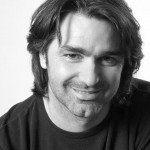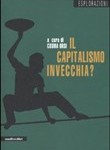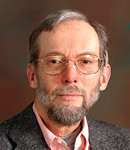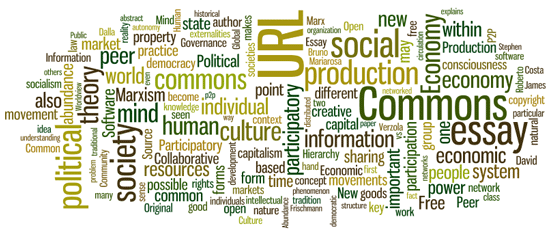 This list is from the great P2P foundation website, which has loads of great articles and information on Peer 2 Peer (P2P) theory. The p2p foundation has loads of interesting articles and is constantly update, a great resource to keep up with what is going on in the world of the commons and P2P theory. A big thank you to P2P for putting together this great resource, hope you learn lots from it.
This list is from the great P2P foundation website, which has loads of great articles and information on Peer 2 Peer (P2P) theory. The p2p foundation has loads of interesting articles and is constantly update, a great resource to keep up with what is going on in the world of the commons and P2P theory. A big thank you to P2P for putting together this great resource, hope you learn lots from it.
This is a list of the articles followed by brief explanation of each and links to the full text.
- 1 Paul S. Adler and Charles Heckscher: Towards Collaborative Community
- 2 Ernesto Arias (et al.) on Transcending the Individual Human Mind through Collaborative Design
- 3 Adam Arvidsson on the Crisis of Value and the Ethical Economy
- 4 Yaneer Bar-Yam on Complexity, Hierarchy, and Networks
- 5 Richard Barbrook on the ‘High-tech Gift Economy’
- 6 Yochai Benkler on Peer Production
- 7 James Boyle, on the Public Domain and the Second Enclosure movement
- 8 George Caffentzis: On the Antagonistic Usage of the Commons Concept
- 9 Kevin Carson, on expanding peer production to the physical domain
- 10 Predrag Cicovacki, on the metaphysics of co-evolution and transdisciplinary methodology
- 11 Julia Cohen, on copyright law and sharing
- 12 Mark Cooper on a Policy for Collaborative Production
- 13 Mariarosa Dalla Costa on the Commons of Land and Food
- 14 Massimo De Angelis on The Production of the Commons and the Explosion of the Middle Class.
- 15 Massimo De Angelis on a political strategy to unite commons and political/social movements
- 16 Paul de Armond, on netwar in political protest
- 17 Erik Douglas, on peer governance and democracy
- 18 Stephen Downes on Free Learning and P2P epistemology
- 19 Nick Dyer-Witheford on the Circulation of the Common
- 20 Jo Freeman, on the dark side of Peer Governance
- 21 Brett Frischmann, an economic theory for the Commons
- 22 Richard Heinberg on The Decentralized Provisioning of the Basic Necessities as the Fight of the Century
- 23 John Heron on the relational ground of human consciousness: Notes on Spiritual Leadership and Relational Spirituality
- 24 Yasuhiko Genku Kimura: Creating a ommicentric Ideosphere
- 25 Magnus Marsdal on Socialist Individualism
- 26 Ugo Mattei
- 27 Eben Moglen on Free Software and the Death of Proprietary Culture
- 28 Cosma Orsi on The Political Economy of Solidarity
- 29 Bruno Perens on The Emerging Economic Paradigm of Open Source
- 30 James Quilligan on a framework for Global Commons-based Governance
- 31 Alan Rayner: Attuning to Natural Energy Flows vs. Abstract Economic Rationality
- 32 Dirk Riehle on the Economics of Open Source Software
- 33 David Ronfeldt on the Evolution of Governance
- 34 Marshall Sahlins on The Original Affluent Society
- 35 Graham Seaman: Can peer production make washing machines?
- 36 Clay Shirky on the web as evolvable system
- 37 David Skrbina, the participatory worldview
- 38 Bruno Theret, on the tradition of ‘civil socialism’
- 39 Evan Thompson, on the enactive theory of consciousness
- 40 Jeff Vail, The Problem of Growth: Hierarchy vs. the Rhizome
- 41 Kazys Varnelis on how network culture differs from postmodernism
- 42 Roberto Verzola on Undermining vs. Developing Abundance
- 43 Raoul Victor, on Free Software, the sharing culture, and Marxism
 Paul S. Adler and Charles Heckscher: Towards Collaborative Community
Paul S. Adler and Charles Heckscher: Towards Collaborative Community
Essay: Paul S. Adler and Charles Heckscher. Towards Collaborative Community / (Book: The Corporation as a Collaborative Community)
URL = http://www-bcf.usc.edu/~padler/research/01-Heckscher-chap01%20copy-1.pdf
This is an absolutely remarkable essay that charts the history of community within the capitalist form, from the earliest community oriented paternalism (the ‘Gemeinshaft’ model described by Tonnies), to the bureaucratic (‘Gesellshaft’) model described by Weber and Durkheim, culminating in the emergence of collaborative community, existing in tension and contradiction within the hierarchical and market environment of for-profit companies.
 Ernesto Arias (et al.) on Transcending the Individual Human Mind through Collaborative Design
Ernesto Arias (et al.) on Transcending the Individual Human Mind through Collaborative Design
Key essay to understand the shift to relationality as the main ontological paradigm.
“The power of the unaided, individual mind is highly overrated: the Renaissance scholar no longer exists. Although creative individuals are often thought of as working in isolation, the role of interaction and collaboration with other individuals is critical [Engelbart, 1995]. Creative activity grows out of the relationship between an individual and the world of his or her work, and from the ties between an individual and other human beings. The predominant activity in designing complex systems is that participants teach and instruct each other [Greenbaum & Kyng, 1991]. Because complex problems require more knowledge than any single person possesses, it is necessary that all involved stakeholders participate, communicate, and collaborate with each other.”
URL = http://l3d.cs.colorado.edu/~gerhard/papers/tochi2000.pdf
 Adam Arvidsson on the Crisis of Value and the Ethical Economy
Adam Arvidsson on the Crisis of Value and the Ethical Economy
This is a very important essay, the first one to my knowledge to directly deal with the crisis of value that results from the emergence of generalized social innovation and peer production. Or in other words: more and more use value is created, but only a small part of it can be monetized. This creates an imbalance in society, where companies are profiting from social innovation, but there is no return mechanism to fund it properly.
The Dornbirn Manifesto by Michel Bauwens is a restatement with some additional remarks, some of which have already been incorporated in this second version of the essay. Both were published around June 2007.
Read it here: The Crisis of Value and the Ethical Economy
 Yaneer Bar-Yam on Complexity, Hierarchy, and Networks
Yaneer Bar-Yam on Complexity, Hierarchy, and Networks
Essay which explains why rising complexity requires hierarchies to be changed by distributed forms of mutual control, i.e. distributed networks and peer to peer dynamics.
Source: COMPLEXITY RISING: FROM HUMAN BEINGS TO HUMAN CIVILIZATION, A COMPLEXITY PROFILE. Yaneer Bar-Yam
URL = http://necsi.org/projects/yaneer/Civilization.html
See our article on Hierarchy for selected key excerpts.
 Richard Barbrook on the ‘High-tech Gift Economy’
Richard Barbrook on the ‘High-tech Gift Economy’
The High-tech Gift Economy
URL = http://www.firstmonday.dk/issues/issue3_12/barbrook/
This is a seminal essay that was often discussed during the first phase of the dotcom era. Abstract from First Monday: “During the Sixties, the New Left created a new form of radical politics: anarcho-communism. Above all, the Situationists and similar groups believed that the tribal gift economy proved that individuals could successfully live together without needing either the state or the market. From May 1968 to the late Nineties, this utopian vision of anarcho-communism has inspired community media and DIY culture activists. Within the universities, the gift economy already was the primary method of socialising labour. From its earliest days, the technical structure and social mores of the Net has ignored intellectual property. Although the system has expanded far beyond the university, the self-interest of Net users perpetuates this hi-tech gift economy. As an everyday activity, users circulate free information as e-mail, on listservs, in newsgroups, within on-line conferences and through Web sites. As shown by the Apache and Linux programs, the hi-tech gift economy is even at the forefront of software development. Contrary to the purist vision of the New Left, anarcho-communism on the Net can only exist in a compromised form. Money-commodity and gift relations are not just in conflict with each other, but also co-exist in symbiosis. The ‘New Economy’ of cyberspace is an advanced form of social democracy.”
 Yochai Benkler on Peer Production
Yochai Benkler on Peer Production
Coase’s Penguin, or Linux and the Nature of the Firm.
URL = http://www.yale.edu/yalelj/112/BenklerWEB.pdf
Also at http://www.benkler.org/CoasesPenguin.html
This essay explains “why the Peer Production mode has” systematic advantages over markets and managerial hierarchies when the object of production is information or culture, and where the capital investment necessary for production-computers and communications capabilities-is widely distributed instead of concentrated.
In particular, this mode of production is better than firms and markets for two reasons. First, it is better at identifying and assigning human capital to information and cultural production processes. In this regard, peer-production has an advantage in what I call “information opportunity cost.” That is, it loses less information about who the best person for a given job might be than do either of the other two organizational modes.
Second, there are substantial increasing returns to allow very larger clusters of potential contributors to interact with very large clusters of information resources in search of new projects and collaboration enterprises. Removing property and contract as the organizing principles of collaboration substantially reduces transaction costs involved in allowing these large clusters of potential contributors to review and select which resources to work on, for which projects, and with which collaborators.”
The Political Economy of the Commons
URL = http://www.upgrade-cepis.org/issues/2003/3/up4-3Benkler.pdf
The concept of Information Commons is defined by Yochai Benchler in “The Political Economy of Commons”, in Upgrade, juin 2003, vol. IV, n° 3
Sharing Nicely: On Shareable Goods and the Emergence of Sharing as a Modality of Economic Production.
URL = http://www.yalelawjournal.org/pdf/114-2/Benkler_FINAL_YLJ114-2.pdf
“The paper offers a framework to explain large scale effective practices of sharing private, excludable goods. It starts with case studies of distributed computing and carpooling as motivating problems. It then suggests a definition for “shareable goods” as goods that are lumpy and mid-grained in size, and explains why goods with these characteristics will have systematic overcapacity relative to the requirements of their owners. The paper then uses comparative transaction costs analysis, focused on information characteristics in particular, combined with an analysis of diversity of motivations, to suggest when social sharing will be better than secondary markets to reallocate this overcapacity to non-owners who require the functionality. The paper concludes with broader observations about the role of sharing as a modality of economic production as compared to markets and hierarchies (whether states or firms), with a particular emphasis on sharing practices among individuals who are strangers or weakly related, its relationship to technological change, and some implications for contemporary policy choices regarding wireless regulation, intellectual property, and communications network design.” (http://www.yalelawjournal.org/pdf/114-2/Benkler_FINAL_YLJ114-2.pdf )
Freedom in the Commons: Towards a Political Economy of Information
URL = http://www.law.duke.edu/shell/cite.pl?52+Duke+L.+J.+1245/
“None of this is to say that nonmarket and decentralized production will completely displace firms and markets. That is not the point. The point is that the networked information economy makes it possible for nonmarket and decentralized models of production to increase their presence alongside the more traditional models, causing some displacement, but increasing the diversity of ways of organizing production rather than replacing one with the other.This diversity of ways of organizing production and consumption, in turn, opens a range of new opportunities for pursuing core political values of liberal societies — democracy, individual freedom, and social justice.” (http://www.law.duke.edu/shell/cite.pl?52+Duke+L.+J.+1245/)
 James Boyle, on the Public Domain and the Second Enclosure movement
James Boyle, on the Public Domain and the Second Enclosure movement
The Second Enclosure Movement and the Construction of the Public Domain
URL = http://www.law.duke.edu/pd/papers/boyle.pdf
The Opposite of Property
URL = http://www.law.duke.edu/boylesite/foreword.pdf
 George Caffentzis: On the Antagonistic Usage of the Commons Concept
George Caffentzis: On the Antagonistic Usage of the Commons Concept
Article: A Tale of Two Conferences: Globalization, the Crisis of Neoliberalism and Question of the Commons. By George Caffentzis
URL = http://www.globaljusticecenter.org/papers/caffentzis.htm
A history of the political usage of the concept of the Commons which distinguishes reformist and radical usage.
Summary and excerpts in our entry: Antagonistic Usage of the Commons Concept
 Kevin Carson, on expanding peer production to the physical domain
Kevin Carson, on expanding peer production to the physical domain
Kevin Carson: Industrial Policy: New Wine in Old Bottles
URL = http://c4ss.org/wp-content/uploads/2009/01/industrialpolicycarson0109.pdf
Very good essay arguing for a new ‘Neotechnic‘, decentralized format of production, largely based on the principles of peer production, and why relocalizing the economy makes a lot of sense.
Though I disagree with the political conclusions of Kevin Carson (abolishing almost all state intervention), I strongly recommend this well-researched essay which tackles nearly all the issues we’re concerned with at the P2P Foundation (note from Michel Bauwens)
 Predrag Cicovacki, on the metaphysics of co-evolution and transdisciplinary methodology
Predrag Cicovacki, on the metaphysics of co-evolution and transdisciplinary methodology
URL = http://www.integralleadershipreview.com/archives/2009-10/2009-10-06-article-cicovaki.php
An important take on the integral ‘transdisciplinary’ method which is crucial to the full understanding of P2P phenomena.
Essay: Transdisciplinarity As An Interactive Method: A Critical Reflection On The Three Pillars Of Transdisciplinarity. Predrag Cicovacki. Integral Leadership Review. Volume IX, No. 5 – October 2009
 Julie Cohen, on copyright law and sharing
Julie Cohen, on copyright law and sharing
“Copyright, Commodification and Culture: Locating the Public Domain,”
URL = http://papers.ssrn.com/sol3/papers.cfm?abstract_id=663652
Comment by David Bollier of the On The Commons weblog: “Georgetown law professor Julie E. Cohen has a path-breaking law review article on copyright law’s failure to recognize the “centrality of borrowing, collaboration and environment to creative practice of all sorts.” Cohen’s paper, “Copyright, Commodification and Culture: Locating the Public Domain,” calls for “a sociology of creative practice” and analyzes why the “public domain,” as traditionally understood in the law, fails to recognize the actual dynamics of creativity.
Cohen writes: “Although economic modeling can contribute to the understanding of markets for creative goods,…. by itself it cannot provide adequate theoretical foundation for understanding the dynamics that drive the development of artistic culture, and therefore it cannot provide adequate theoretical foundations for copyright policy….Creativity and creative practice are social phenomena that are both broader than and antecedent to the institutions with which both economics and more broadly political economy are concerned…. If copyright law is to recognize a right of creative access to the cultural landscape, it is precisely this right that must be limited, yet that is precisely what copyright law increasingly refuses to do. Instead, conventional wisdom holds that any curtailment of derivative rights would reduce “incentives” to invest in works of mass culture.”
“Attention to the social parameters of creative practice suggests that the common in culture is not a separate place, but a distributed property of social space. The legally constituted common should both mirror and express this disaggregation. The paper offers a different organizing metaphor for the relationship between the public and the proprietary that matches the theory and practice of creativity more accurately: The common in culture is the cultural landscape within which creative practice takes place.” (http://papers.ssrn.com/sol3/papers.cfm?abstract_id=663652)
More articles by Julie Cohen at http://www.law.georgetown.edu/faculty/jec/publications.html
Mark Cooper on a Policy for Collaborative Production
The Political Economy of Collaborative Production in the Digital Information Age Journal on Law and High Technology (2006)
URL = http://cyberlaw.stanford.edu/system/files/From+Wifi+to+Wikis+and+Open+Source.pdf
What kind of information infrastructures do we need for more widespread collaborative production to occur, and how do we achieve such policies? This essay has also remarkable good explanations of the various types of property and goods that we are dealing with.
Mariarosa Dalla Costa on the Commons of Land and Food
Mariarosa Dalla Costa has written 3 interrelated essays on Land as Commons and Food as Common and Community:
- Reruralizing the World. PDF, on land as commons
- Mariarosa Dalla Costa: Two Baskets for Change. PDF: 8 policy measures
- Mariarosa Dalla Costa: Food as Common and Community. PDF: on food as common and how it is related to five other commons.
 Massimo De Angelis on The Production of the Commons and the Explosion of the Middle Class.
Massimo De Angelis on The Production of the Commons and the Explosion of the Middle Class.
Very important essay outlining a political strategy of Commoning, and how to deal with Middle Class subjectivity.
URL = http://www.taller-commons.com/downloads/angelis.pdf
Massimo De Angelis on a political strategy to unite commons and political/social movements
Massimo de Angelis, Crises, Movements and Commons. Borderlands e-journal, VOLUME 11 NUMBER 2, 2012.
URL = http://www.borderlands.net.au/vol11no2_2012/deangelis_crises.pdf
“Commons movements’ first goal is addressing directly different needs of reproduction by mobilising the natural and creative resources at their disposal. On the other hand, movements of protest mobilise these resources to put forward claims to the state so as to prevent the cut in these resources or their extension. For this reason, it is possible to find ideological and class divisions between commons movements and protest movements, which provide a fertile ground for capital to use these divisions and further its livelihood and ecological, crisis-ridden agenda. It is therefore becoming a vital necessity to develop paradigmatic horizons that favour an epistemic decoupling from capital, and a sense of how it is possible to link the formation of resilient alternatives that address the problems of ecology and livelihood posed by these crises, while at the same time building social movements that favour these alternatives and open more spaces for their development.”
 Paul de Armond, on netwar in political protest
Paul de Armond, on netwar in political protest
Netwar in the Emerald City, at http://nwcitizen.com/publicgood/reports/wto/
Legendary account of the new swarming tactics employed by the alterglobalist protesters in the Seattle anti-WTO protests.
Erik Douglas, on peer governance and democracy
Erik Douglas. Peer to Peer and the Four Pillars of Democracy
Examines the inter-relationship between peer governance and representative democracy.
Stephen Downes on Free Learning and P2P epistemology
- Introduction to Connective Knowledge, by Stephen Dowes
URL = http://www.downes.ca/cgi-bin/page.cgi?post=33034
This is a marvellous non-technical introduction to participative epistemology. It ends with a critique of the naturalistic conceptions of the Power Law, which states that networks inevitably become unequal, counterposing Knowing Networks as a counter-example.
“First, diversity. Did the process involve the widest possible spectrum of points of view? Did people who interpret the matter one way, and from one set of background assumptions, interact with with people who approach the matter from a different perspective?
Second, and related, autonomy. Were the individual knowers contributing to the interaction of their own accord, according to their own knowledge, values and decisions, or were they acting at the behest of some external agency seeking to magnify a certain point of view through quantity rather than reason and reflection?
Third, interactivity. Is the knowledge being producted the product of an interaction between the members, or is it a (mere) aggregation of the members’ perspectives? A different type of knowledge is produced one way as opposed to the other. Just as the human mind does not determine what is seen in front of it by merely counting pixels, nor either does a process intended to create public knowledge.
Fourth, and again related, openness. Is there a mechanism that allows a given perspective to be entered into the system, to be heard and interacted with by others?”
- Free Learning. Essays on Open Educational Resources and Copyright. Stephen Downes.
URL = http://www.downes.ca/files/FreeLearning.pdf
Collection of materials on the p2p values embedded in open education. Also contains important republished mini-essays such as: Copyright, Ethics and Theft
 Nick Dyer-Witheford on the Circulation of the Common
Nick Dyer-Witheford on the Circulation of the Common
URL = http://www.geocities.com/immateriallabour/withefordpaper2006.html
” Marx deemed the cellular form of capitalism to be the commodity, a good produced for exchange between private owners. His model of the circulation of capital traced the metamorphosis of the commodity into money, which commands the acquisition of further resources to be transformed into more commodities. The theorists of autonomist Marxism demonstrated how this circulation of capital is also a circulation of struggles, meeting resistances at every point. But although this concept proved important for understanding the multiplicity of contemporary anti-capital, it says very little about the kind of society towards which these struggles move, a point on which the autonomist tradition has mainly been mute. Today, new theorizations about multitude and biopolitics should to reconsider this silence. I suggest that the cellular form of communism is the common, a good produced to be shared in association. The circuit of the common traces how shared resources generate forms of social cooperation—associations– that coordinate the conversion of further resources into expanded commons. On the basis of the circuit of capital, Marx identified different kinds of capital—mercantile, industrial and financial—unfolding at different historical moments yet together contributing to an overall societal subsumption. By analogy, we should recognise differing moments in the circulation of the common. These include terrestrial commons (the customary sharing of natural resources in traditional societies); planner commons (for example, command socialism and the liberal democratic welfare state); and networked commons, (the free associations open source software, peer-to-peer networks, grid computing and the numerous other socializations of technoscience). Capital today operates as a systemic unity of mercantile, industrial and financial moments, but the commanding point in its contemporary, neoliberal, phase is financial capital. A twenty-first century communism can, again by analogy, be envisioned as a complex unity of terrestrial, state and networked commons, but the strategic and enabling point in this ensemble is the networked commons. These must however, also be seen in their dependency on, and even potential contradiction, with the other commons sectors. The concept of a complex, composite communism based on the circulation between multiple but commons forms is opens possibilities for new combinations of convivial custom, planetary planning and autonomous association. What follows expand on these cryptic observations.” (http://www.geocities.com/immateriallabour/withefordpaper2006.html)
 Jo Freeman, on the dark side of Peer Governance
Jo Freeman, on the dark side of Peer Governance
URL = http://www.spunk.org/texts/consensu/sp000760.txt
The alterglobalisation’s mode of functioning took a large part of its inspiration from the experience of feminist and civic action groups of the sixties and seventies. What they discovered was that structureless anti-authoritarian modes actually lead to hidden power distributions, so that it is important to have open and transparent procedures that can insure a flexible and wide distribution of power. The following comes from a seminal essay on the subject:
Source: ‘The Tyranny of Structurelessness’, by Jo Freeman, Berkeley Journal of Sociology, 1970
“Contrary to what we would like to believe, there is no such thing as a ‘structureless’ group. Any group of people of whatever nature coming together for any length of time, for any purpose, will inevitably structure itself in some fashion. The structure may be flexible, it may vary over time, it may evenly or unevenly distribute tasks, power and resources over the members of the group. But it will be formed regardless of the abilities, personalities and intentions of the people involved. The very fact that we are individuals with different talents, predispositions and backgrounds makes this inevitable. Only if we refused to relate or interact on any basis whatsoever could we approximate ‘structurelessness’ and that is not the nature of a human group.”
When these principles are applied, they ensure that whatever structures are developed by different movement groups will be controlled by and be responsible to the group. The group of people in positions of authority will be diffuse, flexible, open and temporary. They will not be in such an easy position to institutionalize their power because ultimate decisions will be made by the group at large. The group will have the power to determine who shall exercise authority within it.” (http://www.spunk.org/texts/consensu/sp000760.txt )
 Brett Frischmann, an economic theory for the Commons
Brett Frischmann, an economic theory for the Commons
Brett Frischmann, a professor at Loyola University Chicago School of Law has published an essay, “An Economic Theory of Infrastructure and Commons Management, (89 Minnesota Law Review 4, April 2005). “a rigorous, clear-headed explanation of the economic and social benefits of commons-based infrastructures:
“The basic problem with relying on markets to allocate access to common assets, Frischmann explains, is that the market mechanism exhibits a bias for outputs that generate observable and appropriable returns at the expense of outputs that generate positive externalities [public benefits that cannot be captured by market players]. This is not surprising because the whole point of relying on property rights and the market is to enable private appropriation and discourage externalities. The problem with relying on the market is that potential positive externalities may remain unrealized if they cannot be easily valued and appropriated by those that produce them, even though society as a whole may be better off if those potential externalities were actually produced. “Positive externalities” are precisely those “goods” that benefit all of us, as commoners – clean air, access to information, an open Internet, functioning ecosystems. Yet neoclassical economics and the laws based on it generally discount or ignore these types of value; they assume that monetized forms of individual property are the only important types of value worth maximizing. By looking at “infrastructure” through the lens of the commons, however, we can begin to appreciate the positive, non-market externalities that a resource actually generates – and begin to design public policies to protect these benefits on their own merits.” (Commentary from On the Commons blog, at http://onthecommons.org/node/613; original essay by Frischmann at http://papers.ssrn.com/sol3/papers.cfm?abstract_id=704463; a bio on the author at http://www.luc.edu/law/faculty/frischmann.shtml)
 Richard Heinberg on The Decentralized Provisioning of the Basic Necessities as the Fight of the Century
Richard Heinberg on The Decentralized Provisioning of the Basic Necessities as the Fight of the Century
Introduces four scenarios for the future decades in which p2p infrastructures will be deployed. A must read strategic essay.
Full original at http://www.postcarbon.org/article/714558-the-fight-of-the-century
“The decentralized provision of basic necessities is not likely to flow from a utopian vision of a perfect or even improved society (as have some social movements of the past). It will emerge instead from iterative human responses to a daunting and worsening set of environmental and economic problems, and it will in many instances be impeded and opposed by politicians, bankers, and industrialists. It is this contest between traditional power elites on one hand, and growing masses of disenfranchised poor and formerly middle-class people attempting to provide the necessities of life for themselves in the context of a shrinking economy, that is shaping up to be the fight of the century.”
 John Heron on the relational ground of human consciousness: Notes on Spiritual Leadership and Relational Spirituality
John Heron on the relational ground of human consciousness: Notes on Spiritual Leadership and Relational Spirituality
John Heron:
“I prefer to think of the spiritual development of human culture as rooted in degrees of relational, moral insight and not in an evolutionary logic. Evolution as a concept seems best left to natural processes. Otherwise intellectual bids to know what evolution is up to and what is coming next culturally, rapidly convert into hegemonic arrogance and attempts at social and intellectual control. The developing of the human spirit in cultural forms is a different category and is very close in my view to the way in which our realization of an extended doctrine of rights, in theory and practice, unfolds.
There seem to be at least four degrees of such unfolding:
1. Autocratic cultures which define rights in a limited and oppressive way and there are no rights of political participation.
2. Narrow democratic cultures which practise political participation through representation, but have no or very limited participation of people in decision-making in all other realms, such as research, religion, education, industry, etc.
3. Wider democratic cultures which practice both political participation and varying degree of wider kinds of participation.
4. Commons peer-to-peer cultures in a libertarian and abundance-oriented global network with equipotential rights of participation in decision-making of everyone in every field of human endeavour, in relation to nature, culture, the subtle and the spiritual.
These four degrees could be stated in terms of the relations between hierarchy, co-operation and autonomy (deciding for others, deciding with others, deciding by oneself).
1.Hierarchy defines, controls and constrains co-operation and autonomy.
2. Hierarchy empowers a measure of co-operation and autonomy in the political sphere only.
3. Hierarchy empowers a measure of co-operation and autonomy in the political sphere and in varying degrees in other spheres.
4. The sole role of hierarchy is in its spontaneous emergence in (a) the initiation , and (b) the continuous flowering, of autonomy-in-co-operation, of spirit-in-manifestation, in all spheres of human endeavour.”
 Yasuhiko Genku Kimura: Creating a ommicentric Ideosphere
Yasuhiko Genku Kimura: Creating a ommicentric Ideosphere
- Kosmic Alignment. A Principle of Global Unity. By Yasuhiko Genku Kimura. Reprinted with permission from Kosmos Journal, Spring/Summer 2005, www.kosmosjournal.org.
URL = http://www.via-visioninaction.org/via-li/articles/Kosmic_Alignment.pdf
“We human beings are at our best not when we are engaged in abstract solitary reflection or on our individual transformation for its own sake but when we are engaged together in the act of transforming the world. The act of idea-generation through authentic thinking and the sustained engagement in the conversation of humankind, if conducted in the context of pursuit of truth, beauty, and goodness, will lead to powerful moral action that will engender a New World. To engage in such moral action and to become a co-creator of a New World is to become a world-weaver in the act of weaving the world and a history-maker in the act of making history.”
 Magnus Marsdal on Socialist Individualism
Magnus Marsdal on Socialist Individualism
Socialist Individualism. Essay by Magnus Marsdal.
URL = http://www.autodidactproject.org/other/marxind2.html
“socialism is defined as the democratic management of society’s vital resources (“the economy‿). Under Stalinism, undeniably the economy was subject to explicitly political governance, but no-one would ever label that political economy “democratic‿. It belongs at the far end of our axis, with meagre individual liberties. Now, notice how the nearest challenger of the Evil Empire in this respect is unrestrained capitalism! Market liberalism weakens the position of the working individual on the labour market as far as it can, and does pretty much the same with the political bodies of democracy. Under the welfare state there are substantial “socialist inroads‿ in the capitalist system. This partial protection from “the tyranny of the rich‿ strengthens the position of the individual.
When the historical advancement of democracy is seen like this, the current position of “the new movements‿—arguing that “another world is possible‿ and at the same time fiercely defending the existing welfare state arrangements—becomes less paradoxical. Neoliberalism is perceived as reactionary. The foes of the welfare state are truly “winding the clock backwards‿. Therefore we fight to defend what already exists. But there is something to fight for beyond the instable truce of the so-called mixed economy of Keynesian times. Therefore, we also fight for what does not yet exist.”
 Ugo Mattei
Ugo Mattei
An absolutely crucial text by Ugo Mattei on how the Western legal tradition needs to be fundamentally overturned in order for the common and the commons to emerge as core principle of a new legal-institutional system:
- The State, the Market, and some Preliminary Question about the Commons. Ugo Mattei.
URL = http://works.bepress.com/cgi/viewcontent.cgi?article=1040&context=ugo_mattei
 Eben Moglen on Free Software and the Death of Proprietary Culture
Eben Moglen on Free Software and the Death of Proprietary Culture
URL = http://www.cabinetmagazine.org/issues/10/dot_communist.php
Classic statement for the freeing of copyright.
Introductory paragraph: “A specter is haunting multinational capitalism — the specter of free information. All the powers of “globalism” have entered into an unholy alliance to exorcize this specter: Microsoft and Disney, the World Trade Organization, the United States Congress and the European Commission. Where are the advocates of freedom in the new digital society who have not been decried as pirates, anarchists, communists? Have we not seen that many of those hurling the epithets were merely thieves in power, whose talk of “intellectual property” was nothing more than an attempt to retain unjustifiable privileges in a society irrevocably changing? But it is acknowledged by all the Powers of Globalism that the movement for freedom is itself a Power, and it is high time that we should publish our views in the face of the whole world, to meet this nursery tale of the Specter of Free Information with a Manifesto of our own.”
Freeing the Mind: Free Software and the Death of Proprietary Culture
URL = http://old.law.columbia.edu/publications/maine-speech.html
What free software means for society and culture. A must-read.
 Cosma Orsi on The Political Economy of Solidarity
Cosma Orsi on The Political Economy of Solidarity
URL = http://www.ruc.dk/upload/application/pdf/f51d6748/Research%20report%205_2005%20Cosma%20Orsi.pdf
The essay is a critique of what the author calls the Political Economy of Freedom, which is at the basis of our current system. This conception considers, erroneously of course, that humans are atomized individuals, solely in the game for their utilitarian benefit, making choices as if they were not a part of various concrete communities and societies. The dominant market form, based on impersonal relations, is based on a implicit contract of reciprocal indifference.
Hence what we need, if we want to develop more humane economies and societies, which do not futher disintegrate our natural habitat and human civilization, is a recognition of our connectedness. This will lead to a Political Economy of Solidarity, based on a implicit Contract of Reciprocal Solidarity, and to a conception of society which does not only recognized the separate individual with his negative rights not be interfered with, but also take into account the social right for the Common Good. The essay then investigates the results of such a new view.
For those who want to know even more, they can order the fascinating book, which I’m currently reading:
ORSI, Cosma (2006), The Value of Reciprocity. Arguing for a Plural Political Economy, Roskilde (DK): Federico Caffè Centre Publisher & University of Roskilde.
The author can be reached at cosma at ruc.dk
Bruno Perens on The Emerging Economic Paradigm of Open Source
Key essay to understand how open source is embedded in the market, by one of the free software founding fathers.
URL = http://perens.com/Articles/Economic.html
“Open Source can be explained entirely within the context of conventional open-market economics. Indeed, it turns out that it has much stronger ties to the phenomenon of capitalism than you may have appreciated.”
 James Quilligan on a framework for Global Commons-based Governance
James Quilligan on a framework for Global Commons-based Governance
Essay: People Sharing Resources. Toward a New Multilateralism of the Global Commons. James Bernard Quilligan. Published in Kosmos Journal, Fall | Winter 2009
URL = http://www.kosmosjournal.org/kjo2/bm~doc/people-sharing-resources.pdf
The author outlines the key concepts for establishing a Global Common Wealth:
- Establishing Global Common Goods and a Commons Reserve Currency
- The Co-Governance and Co-Production of the Commons through Commons Trusts on the basis of Social Charters
 Alan Rayner: Attuning to Natural Energy Flows vs. Abstract Economic Rationality
Alan Rayner: Attuning to Natural Energy Flows vs. Abstract Economic Rationality
We need to overturn our fundamental relationship to the natural world:
Essay: Inclusionality and sustainability – attuning with the currency of natural energy flow and how this contrasts with abstract economic rationality. By Alan D.M. Rayner
Paper available via the author at a.d.m.rayner@bath.ac.uk
Dirk Riehle on the Economics of Open Source Software
Dirk Riehle. “The Economic Motivation of Open Source Software: Stakeholder Perspectives.” IEEE Computer, vol. 40, no. 4 (April 2007). Page 25-32.
Original at http://www.riehle.org/computer-science/research/2007/computer-2007-article.html
This essay explains why open source software is a competitive choice for business stakeholders, and which parties it benefits in particular. It’s an excellent introduction to the economic part of the equation, explaining why it is becoming such an important model.
 David Ronfeldt on the Evolution of Governance
David Ronfeldt on the Evolution of Governance
Tribes, Institutions, Markets, Networks.. Text by David Ronfeldt.
Original at http://www.rand.org/publications/P/P7967/P7967.pdf
Excerpts at http://www.p2pfoundation.net/David_Ronfeldt_on_the_Evolution_of_Governance
“Power and influence appear to be migrating to actors who are skilled at developing multiorganizational networks, and at operating in environments where networks are an appropriate, spreading form of organization. In many realms of society, they are gaining strength relative to other, especially hierarchical forms. Indeed, another key proposition about the information revolution is that it erodes and makes life difficult for traditional hierarchies.
This trend ”the rise of network forms of organization” is so strong that, projected into the future, it augurs major transformations in how societies are organized.
What forms account for the organization of societies? How have people organized their societies across the ages?
The answer may be reduced to four basic forms of organization:
1. the kinship-based tribe, as denoted by the structure of extended families, clans, and other lineage systems.
2. the hierarchical institution, as exemplified by the army, the (Catholic) church, and ultimately the bureaucratic state.
3. competitive-exchange market, as symbolized by merchants and traders responding to forces of supply and demand.
4. and the collaborative network, as found today in the web-like ties among some NGOs devoted to social advocacy.”
 Marshall Sahlins on The Original Affluent Society
Marshall Sahlins on The Original Affluent Society
The Original Affluent Society
URL = http://www.appropriate-economics.org/materials/Sahlins.pdf
Marshall Sahlins, celebrated anthropologist, was one of the first to challenge the industrial-era myth of progress, showing in his essay on The Original Affluent Society, that tribal economies were in fact operating in a context of abundance.
“When Herskovits (13) was writing his Economic Anthropology (1958), it was common anthropological practice to take the Bushmen or the native Australians as “a classic illustration; of a people whose economic resources are of the scantiest”, so precariously situated that “only the most intense application makes survival possible”. Today the “classic” understanding can be fairly reversed- on evidence largely from these two groups. A good case can be made that hunters and gatherers work less than we do; and, rather than a continuous travail, the food quest is intermittent, leisure abundant, and there is a greater amount of sleep in the daytime per capita per year than in any other condition of society. The most obvious, immediate conclusion is that the people do not work hard. The average length of time per person per day put into the appropriation and preparation of food was four or five hours. Moreover, they do not work continuously. The subsistence quest was highly intermittent. It would stop for the time being when the people had procured enough for the time being. Which left them plenty of time to spare. Clearly in subsistence as in other sectors of production, we have to do with an economy of specific, limited objectives. By hunting and gathering these objectives are apt to be irregularly accomplished, so the work pattern becomes correspondingly erratic.”
Graham Seaman: Can peer production make washing machines?
Original title: The Two Economies Or: Why the washing machine question is the wrong question
URL = http://second.oekonux-conference.org/documentation/texts/Seaman.html
This is an extraordinary presentation examining how free software/peer production can co-exist with the capitalist system and eventually overtake it. It contrasts the co-existence of the two modes today, with the co-existence of the guild system with the early manufacturing undertaken by independent journeymen who could no longer find a place in that old guild system.
Large excerpts at Can peer production make washing machines?
 Clay Shirky on the web as evolvable system
Clay Shirky on the web as evolvable system
In Praise of Evolvable Systems’
One of the best essays explainging why the Web became the next big thing: because, despite its flaws, it was designed as an evolvable thing.
URL = http://www.shirky.com/writings/evolve.html
 David Skrbina, the participatory worldview
David Skrbina, the participatory worldview
Participation, Organization, and Mind: Toward a Participatory Worldview.
URL = http://www.bath.ac.uk/carpp/davidskrbina/summarycontents.htm
“As I conceive it, the concept of ‘participation’ is fundamentally a mental phenomenon, and therefore a key aspect of the Participatory Worldview is the idea of ‘participatory mind’. In the Mechanistic Worldview mind is a mysterious entity, attributed only to humans and perhaps higher mammals. In the Participatory Worldview mind is a naturalistic, holistic, and universal phenomenon. Human mind is then seen as a particular manifestation of this universal nature. Philosophical systems in which mind is present in all things are considered versions of panpsychism, and hence I argue for a system that I call ‘participatory panpsychism’. My particular articulation of participatory panpsychism is based on ideas from chaos theory and nonlinear dynamics, and is called ‘hylonoism’. In support of my theory I draw from an extensive historical analysis, both philosophical and scientific. I explore the notion of participation in its historical context, from its beginnings in Platonic philosophy through modern-day usages. I also show that panpsychism has deep intellectual roots, and I demonstrate that many notable philosophers and scientists either endorsed or were sympathetic to it. Significantly, these panpsychist views often coexist and correspond quite closely to various aspects of participatory philosophy. Human society is viewed as an important instance of a dynamic physical system exhibiting properties of mind. These properties, based on the idea of participatory exchange of matter and energy, are argued to be universal properties of physical systems. They provide an articulation of the universal presence of participatory mind. Therefore I conclude that participation is the central ontological fact, and may be seen as the core of a new conception of nature and reality.” (http://www.bath.ac.uk/carpp/davidskrbina/summarycontents.htm)
Thesis Title: Participation, Organization, and Mind: Toward a Participatory Worldview.
Book: David Skrbina. Panpsychism in the West. MIT Press, 2005
David Skrbina is a student and continuator of Henryk Skolimowsky’s work on the Participatory Mind
“The astrophysicist John Archibald Wheeler may have been the first to announce, in an articulate way (in the early 1970s), the idea of the Participatory Universe. He wrote, “The universe does not exist ‘out there’ independent of us. We are inescapably involved in bringing about that which appears to be happening. We are participators. In some strange sense this is a Participatory Universe.”
In the early 1980s, drawing from the insights of Wheeler, on the one hand (“In some strange sense this is a participatory universe”), and building on the insights of Teilhard de Chardin (“We are evolution conscious of itself”), I have developed the theory of the Participatory Mind. This theory, on the one hand, attempts to vindicate the claims of the New Physics about the participatory nature of the universe; and, on the other hand, attempts to fill the missing dimension in Teilhard’s opus — which wonderfully describes the unfoldment of evolution but misses the role of the mind in the whole process. Consciousness is one of the key terms in Teilhard’s story. But strangely, it is consciousness as if there were no minds. The theory of the Participatory mind provides an epistemological foundation to Teilhard’s cosmology. The participatory theory of mind maintains that our world is the creation of our mind. But not in a solipsistic manner a la Berkeley (esse-percipi), but in a participatory manner: we have become aware that we can elicit from reality only that much as our mind is capable of conceiving. This is precisely the sense in which we say that we dwell in a participatory universe. We elicit what is potentially ‘out there’ in continuous acts of participation. Participation is of the essence not only in our cognitive acts but also in our social activities and political endeavors. Tell me what you participate in and I will tell you who you are; and what the meaning of your life is. We become that in which we participate. As we participate so we become. If we participate all the time in trivial matters, we become trivial persons.” (http://epc.eco-tea.com/articles/cosmocracy.html)
 Bruno Theret, on the tradition of ‘civil socialism’
Bruno Theret, on the tradition of ‘civil socialism’
The peer to peer movement differs from the traditional socialist movement in that it does not rely on the state, but on autonomous developments within civil society. Such a movement was prefigured by what Bruno Theret calls the tradition of civil socialism. Very interesting French-language essay.
The essay by Bruno Theret is at http://fr.pekea-fr.org/?p=11&c=2-3-Theret.html
Theret also refers to three historical traditions necessary to develop these ideas further: 1) the pre-marxist socialism of Pierre Leroux, very strong in the revolutions of 1848; 2) the federal or guild socialism of Karl Polanly, author of the landmark book The Great Transformation; 3) the contemporary neo-communautarian theory of Michael Walzer.
 Evan Thompson, on the enactive theory of consciousness
Evan Thompson, on the enactive theory of consciousness
Title: Human Consciousness: from intersubjectivity to interbeing
URL = http://www.philosophy.ucf.edu/pcsfetz1.html
Evan Thompson contrasts three approaches to human consciousness. He finds that both the cognitivist and the connectionist approaches rely on a undue separation between a reprentational mind and the world it represents. The enactive approach, pioneered by Varela and others, on the other hand, is based on a structural coupling of the brain, the body, and its environment.
“Human consciousness is not located in the head, but is immanent in the living body and the interpersonal social world. One’s consciousness of oneself as an embodied individual embedded in the world emerges through empathic cognition of others. Consciousness is not some peculiar qualitative aspect of private mental states, nor a property of the brain inside the skull; it is a relational mode of being of the whole person embedded in the natural environment and the human social world.”
More by Evan Thompson at http://individual.utoronto.ca/evant/
 Jeff Vail, The Problem of Growth: Hierarchy vs. the Rhizome
Jeff Vail, The Problem of Growth: Hierarchy vs. the Rhizome
Five-part essay by Jeff Vail, who also wrote the Theory of Power:
Jeff Vail:
“”The Problem of Growth” addresses what I see as the critical problem facing humanity: the structure of our civilization, its inherent need to grow (and therefore its unsustainability), and how we can fix the problem realistically. My proposed solution is, by definition, quite radical, because it rejects the prevalent problem-solving mechanism of modern technology: that we can use technology to continually mitigate the symptoms, rather than take the difficult (but, as I will argue, necessary) step of actually identifying and addressing the underlying problem.”
Access via http://www.jeffvail.net/2007/02/problem-of-growth.html
 Kazys Varnelis on how network culture differs from postmodernism
Kazys Varnelis on how network culture differs from postmodernism
In “The Meaning of Network Culture”, the author offers a cogent analysis of network culture compared to the earlier digital culture associated with postmodernism. He covers issues such as the evolution of the subject and discusses how networked publics affect democracy. I’m adding this as a key essay, as I’ve never seen a clear treatment comparing the emergent p2p culture with postmodernism.
Access via http://www.eurozine.com/articles/2010-01-14-varnelis-en.html
 Roberto Verzola on Undermining vs. Developing Abundance
Roberto Verzola on Undermining vs. Developing Abundance
The above link contains long excerpts of two important texts developing a philosophy, politics and economics related to abundance.
For more context, see http://rverzola.wordpress.com/2008/11/09/classifying-managing-abundance/
1. Verzola, Roberto, Undermining Abundance (Counter-Productive Uses of Technology and Law in Nature, Agriculture and the Information Sector)(July 14, 2008). INTELLECTUAL PROPERTY RIGHTS AND ACCESS TO KNOWLEDGE, Gaelle Krikorian and Amy Kapczynski, eds., Zone Books, Forthcoming. Available at SSRN: http://ssrn.com/abstract=1160044
2. Verzola, Roberto, Studying Abundance. Draft at http://rverzola.files.wordpress.com/2008/11/studying-abundance-1.pdf
3. Verzola, Roberto. Essay: 21st-Century Political Economies: Beyond Information Abundance. by Roberto Verzola. International Review of Information Ethics. Issue No. 011, Vol. 11 – October 2009 [1]
Abstract:
“As a result of the relatively low cost of digital reproduction, a global transformation is occurring in the nature of products and processes and in types of goods and services. Arising from information abundance, this global transformation is making the phenomenon of abundance a major field of study, not only for economists but also for other social scientists and physical scientists as well. This essay proposes an economic definition of abundance and a typology of sources of abundance. It argues that real economic abundance can come about only when the demand for a good is finite and the plentiful supply makes the abundant good affordable enough to all members of society. It lists an abundance-nurturing ethic as a major goal of abundance management, and encourages economists to make abundance together with scarcity their conceptual point of departure. Finally it links the phenomenon of abundance to the concept of the commons.”
Raoul Victor, on Free Software, the sharing culture, and Marxism
The Visibility of the Revolutionary Project and New Technologies
URL = http://dorax.club.fr/Visibility.htm
Raoul is the pen name of a French socialist activist. His thesis is that the widespread emergence of sharing practices makes possible a visioning of what a non-capitalist future would look like, something hitherto impossible, and on of the key sources for the failure of radical social change efforts. This is a key text from within the Marxist tradition.
Free Software and Market Relations
URL = http://www.oekonux.org/texts/marketrelations.html
This essay defends the idea that free sofware is a germ of what the future society may look like, and is translated from a debate within a French Marxist group.
Marxism and Free Software, an analysis by Raoul Victor
URL = http://www.oekonux-konferenz.de/dokumentation/texte/Victor.html
The author examines three questions: 1) To which extent is Marxism confirmed by the reality of free-software? 2) To which extent is Marxism questioned by this reality? 3) Which relation between class struggle and free-software?
“Marx did not know computers, nor software. But the reality of the contradictions that gave birth to free-software is a perfect confirmation of his vision of history. But that is not all. Free-software is also an evidence of the Marxist idea that the post-capitalist society can be a worldwide non-merchant society, and not a bureaucratic wage-slave society, for example. Finally, it confirms the Marxist conviction that communist ideas are not the product of some brilliant individual brain but the movement of capitalist society itself. Even if many hackers still think that “Marxism” means a hundred million deaths in the 20th century, they are acting, without knowing it, some of the basic ideas of the true Marxism.
To which extent is Marxism questioned by the reality of free-software? For Marxism there is no possibility of development of a communist economic form within capitalism. The revolutionary class, the working class, is an exploited class, without power on the economy. It cannot have the power to build a new social organization without making first a political revolution, contrary to the past where the revolutionary class, the bourgeoisie, for example, had built its economic power within feudalism, within the old society. Graham Seaman, in a mail in the English list said that this idea “doesn’t seem to be ever explicit in Marx. But it certainly seems to be taken for granted by every communist after Marx”.
Marx wrote about the workers cooperatives, which were an important part of the workers movement in the 19th century. He said that the capitalist-worker relation was to a certain degree eliminated inside the cooperative. But he insisted on the fact that they remained prisoners of the surrounding capitalist world, that the workers were in fact their own collective capitalists and that they would not resist to the development of the trusts and monopolies. Marx never developed a theory about a possible coexistence between capitalism and lasting, stable germs of communism.
In that sense, if we understand free-software as germs of a communist society, it contradicts a specific aspect of Marxism. But many questions remain: 1) Can these germs easily coexist with capitalism? 2) Is a war between the two worlds avoidable? 3) Can these germs develop to the point of supplanting capitalism? 4) Is this possible without a political revolution?”
The Debate in French continues, at http://membres.lycos.fr/resdisint/Arch_capit/020629JCrt.htm ; http://membres.lycos.fr/resdisint/Arch_capit/020608RVrt.htm ; all these discussions take place at http://membres.lycos.fr/resdisint/





Also of possible interest:
Yannick Rumpala, Knowledge and praxis of networks as a political project, 21st Century Society, Volume 4, Issue 3, November 2009, http://www.scribd.com/doc/85760369/Rumpala-Knowledge-and-Praxis-of-Networks-as-a-Political-Project-21st-Century-Society1